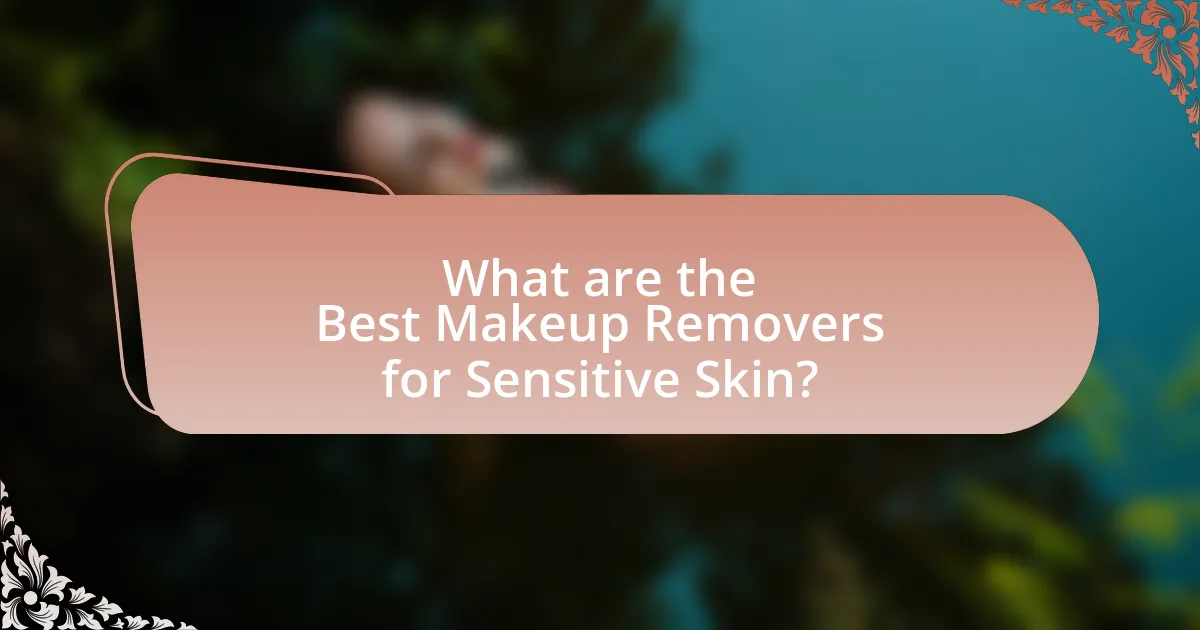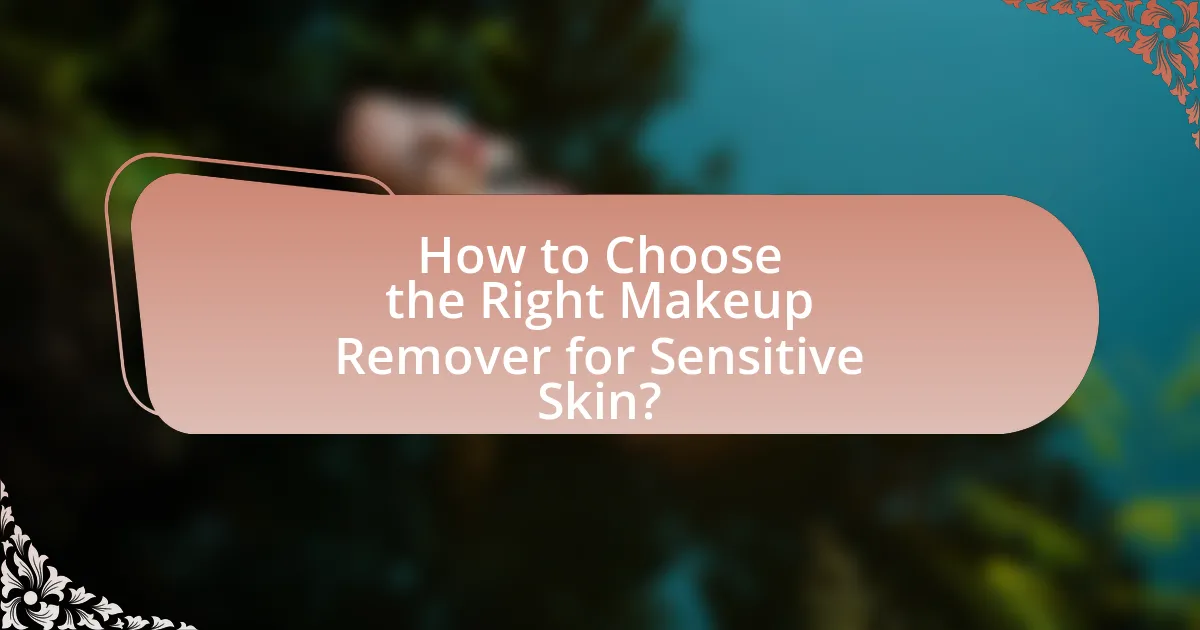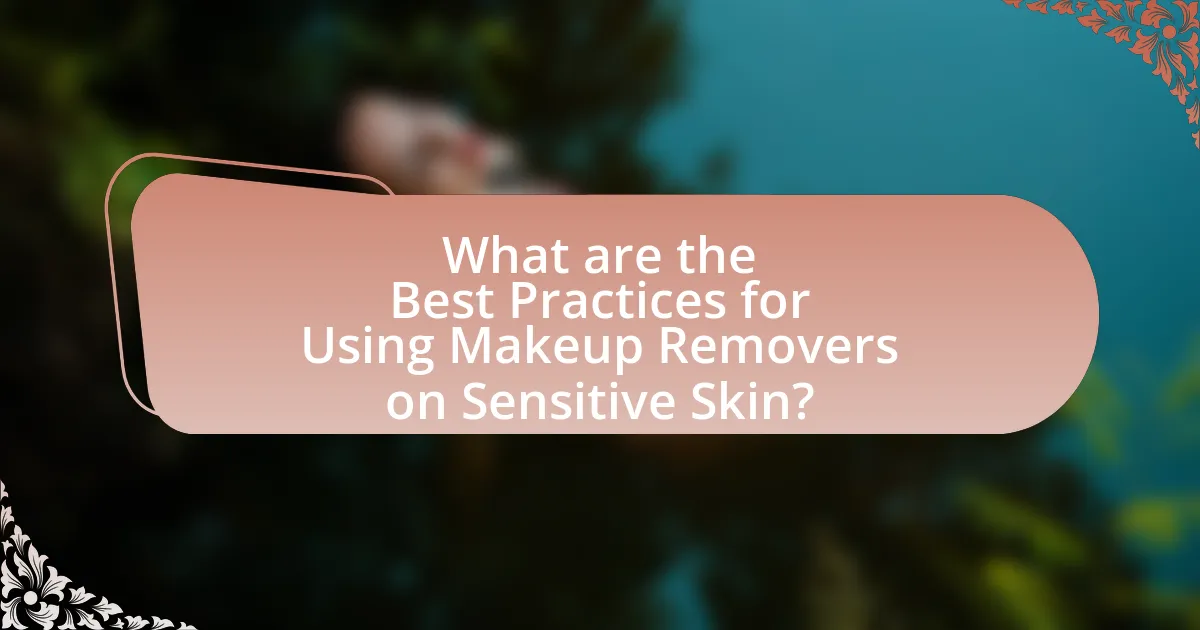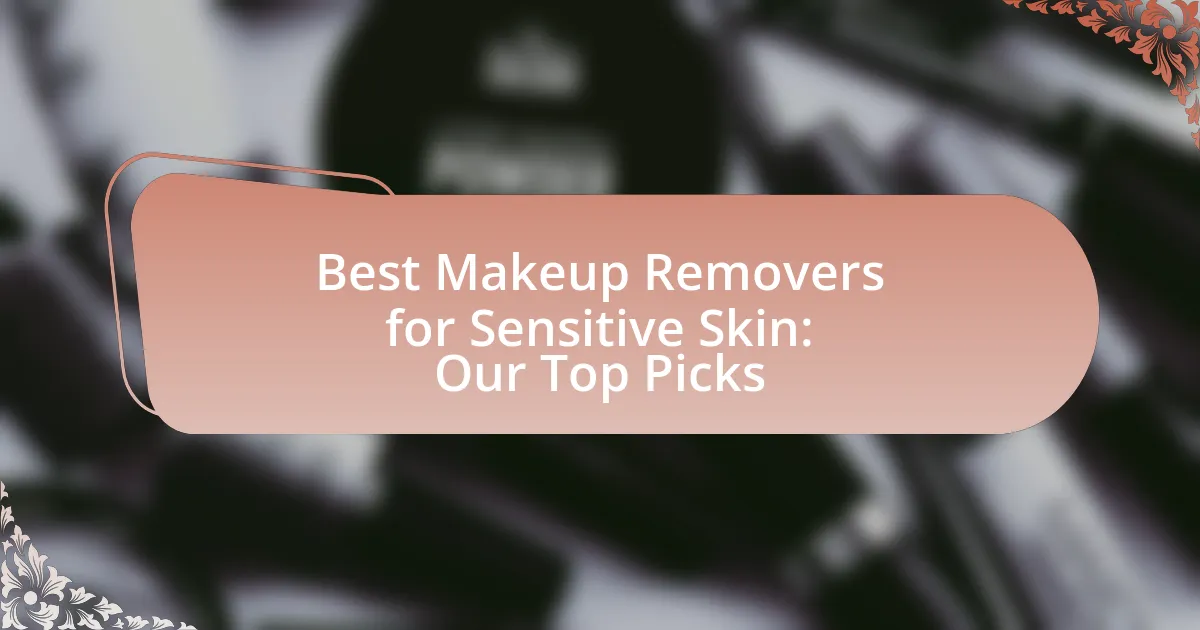The article focuses on the best makeup removers for sensitive skin, highlighting effective options such as micellar water, oil-based cleansers, and gentle cream cleansers. It emphasizes the importance of selecting products that minimize irritation and allergic reactions, detailing ingredients to avoid, such as alcohol and fragrances. The article also discusses the differences between oil-based and water-based removers, the significance of product formulation, and best practices for application to ensure thorough cleansing without damaging sensitive skin. Additionally, it provides insights into user reviews and how they influence product selection, along with tips for enhancing the effectiveness of makeup removers.

What are the Best Makeup Removers for Sensitive Skin?
The best makeup removers for sensitive skin include micellar water, oil-based cleansers, and gentle cream cleansers. Micellar water, such as Bioderma Sensibio H2O, effectively removes makeup while being non-irritating due to its gentle formulation. Oil-based cleansers like DHC Deep Cleansing Oil dissolve makeup without stripping the skin’s natural moisture, making them suitable for sensitive skin. Gentle cream cleansers, such as CeraVe Hydrating Cleanser, contain ceramides and hyaluronic acid, which help maintain the skin’s barrier while cleansing. These products are specifically formulated to minimize irritation and are often dermatologically tested for sensitive skin.
Why is it important to choose the right makeup remover for sensitive skin?
Choosing the right makeup remover for sensitive skin is crucial to prevent irritation and allergic reactions. Sensitive skin often reacts negatively to harsh chemicals and fragrances commonly found in many makeup removers, leading to redness, itching, or breakouts. According to a study published in the Journal of Dermatological Treatment, individuals with sensitive skin reported a significant reduction in irritation when using gentle, hypoallergenic products. Therefore, selecting a makeup remover specifically formulated for sensitive skin helps maintain skin health and comfort.
What ingredients should be avoided in makeup removers for sensitive skin?
Makeup removers for sensitive skin should avoid ingredients such as alcohol, fragrances, and sulfates. Alcohol can cause dryness and irritation, fragrances may trigger allergic reactions, and sulfates can strip the skin of its natural oils, leading to further sensitivity. Studies have shown that these components can exacerbate skin conditions like eczema and rosacea, making them unsuitable for sensitive skin types.
How can the wrong makeup remover affect sensitive skin?
Using the wrong makeup remover can lead to irritation, redness, and allergic reactions in sensitive skin. Sensitive skin often has a compromised barrier, making it more susceptible to harsh ingredients found in some makeup removers, such as alcohol, fragrances, or sulfates. These ingredients can strip the skin of its natural oils, leading to dryness and exacerbating sensitivity. Studies have shown that individuals with sensitive skin report higher instances of adverse reactions to products containing irritants, highlighting the importance of selecting gentle, hypoallergenic formulations specifically designed for sensitive skin.
What types of makeup removers are suitable for sensitive skin?
Makeup removers suitable for sensitive skin include micellar water, oil-based cleansers, and gentle cream cleansers. Micellar water contains tiny micelles that attract and lift away makeup without harsh rubbing, making it ideal for delicate skin. Oil-based cleansers effectively dissolve makeup while providing hydration, which is beneficial for sensitive skin types. Gentle cream cleansers are formulated with soothing ingredients that cleanse without stripping the skin’s natural moisture barrier. These types of removers are often free from fragrances and alcohol, reducing the risk of irritation.
What are the differences between oil-based and water-based makeup removers?
Oil-based makeup removers effectively dissolve long-wearing and waterproof makeup due to their ability to break down oil-based products. In contrast, water-based makeup removers primarily use water and are more suitable for light makeup, as they may struggle to remove heavier formulations. Oil-based removers often leave a moisturizing residue, which can be beneficial for dry skin, while water-based options tend to provide a refreshing feel but may require more effort to fully cleanse heavy makeup.
How do micellar waters work for sensitive skin?
Micellar waters work for sensitive skin by utilizing tiny micelles, which are oil molecules suspended in water, to attract and lift away dirt, makeup, and impurities without the need for harsh scrubbing. This gentle cleansing action minimizes irritation, making micellar waters suitable for sensitive skin types. Studies have shown that micellar water formulations often include soothing ingredients like glycerin or aloe vera, which help to hydrate and calm the skin, further reducing the risk of redness or discomfort.
What are the top-rated makeup removers for sensitive skin?
The top-rated makeup removers for sensitive skin include micellar water, oil-based cleansers, and gentle cream cleansers. Micellar water, such as Bioderma Sensibio H2O, is highly regarded for its ability to remove makeup without irritation, as it contains soothing ingredients like cucumber extract. Oil-based cleansers, like DHC Deep Cleansing Oil, effectively dissolve makeup while maintaining skin hydration, making them suitable for sensitive skin types. Gentle cream cleansers, such as Cetaphil Gentle Skin Cleanser, are formulated to cleanse without stripping moisture, ensuring comfort for sensitive skin. These products are consistently recommended by dermatologists and beauty experts for their efficacy and gentle formulations.
What features make these products stand out?
The standout features of the best makeup removers for sensitive skin include gentle formulations, hypoallergenic ingredients, and effective cleansing properties. These products are specifically designed to minimize irritation while thoroughly removing makeup, which is crucial for sensitive skin types. For instance, many of these removers utilize soothing agents like aloe vera or chamomile, which are known for their calming effects on the skin. Additionally, they often avoid harsh chemicals, fragrances, and alcohol, which can exacerbate sensitivity. Clinical studies have shown that products with such formulations significantly reduce the risk of allergic reactions and skin irritation, making them ideal for individuals with sensitive skin.
How do user reviews influence the selection of these products?
User reviews significantly influence the selection of makeup removers for sensitive skin by providing firsthand experiences and insights from actual users. These reviews help potential buyers assess product effectiveness, safety, and compatibility with sensitive skin, which is crucial for avoiding irritation. According to a study published in the Journal of Consumer Research, 70% of consumers trust online reviews as much as personal recommendations, highlighting their impact on purchasing decisions. Additionally, products with higher ratings and positive feedback tend to attract more attention, leading to increased sales and consumer confidence in the product’s quality.

How to Choose the Right Makeup Remover for Sensitive Skin?
To choose the right makeup remover for sensitive skin, prioritize products labeled as hypoallergenic, fragrance-free, and formulated specifically for sensitive skin types. These characteristics help minimize irritation and allergic reactions, which are common in sensitive skin. Additionally, opt for gentle ingredients such as micellar water or oil-based removers, as they effectively dissolve makeup without harsh scrubbing. Research indicates that products containing soothing agents like aloe vera or chamomile can further reduce the risk of irritation, making them suitable for sensitive skin.
What factors should be considered when selecting a makeup remover?
When selecting a makeup remover, factors to consider include skin type compatibility, ingredient safety, and effectiveness in removing makeup. Skin type compatibility ensures that the remover does not irritate sensitive skin; for instance, oil-based removers may be suitable for dry skin, while gel-based options are often better for oily skin. Ingredient safety is crucial, as formulations free from alcohol, fragrances, and harsh chemicals reduce the risk of irritation and allergic reactions. Effectiveness is measured by the remover’s ability to dissolve various makeup types, including waterproof products, which often require specific formulations for complete removal.
How does skin type influence the choice of makeup remover?
Skin type significantly influences the choice of makeup remover by determining the formulation that best suits an individual’s skin needs. For example, individuals with oily skin may benefit from oil-free or gel-based removers that effectively dissolve makeup without adding excess oil, while those with dry skin should opt for creamy or hydrating formulas that provide moisture and prevent irritation. Sensitive skin types require gentle, fragrance-free removers to minimize the risk of allergic reactions or irritation. Research indicates that using the appropriate makeup remover for one’s skin type can enhance skin health and prevent issues such as breakouts or dryness, thereby validating the importance of this consideration in makeup removal routines.
What role does product formulation play in effectiveness?
Product formulation is crucial in determining the effectiveness of makeup removers for sensitive skin. A well-designed formulation ensures that the ingredients work synergistically to dissolve makeup while minimizing irritation. For instance, formulations that include gentle surfactants and soothing agents like aloe vera or chamomile can effectively remove makeup without compromising skin integrity. Studies have shown that products with balanced pH levels and hypoallergenic ingredients significantly reduce the risk of adverse reactions in sensitive skin, thereby enhancing overall effectiveness.
How can you test a makeup remover for sensitivity?
To test a makeup remover for sensitivity, apply a small amount of the product to a discreet area of skin, such as the inner wrist or behind the ear, and observe for any adverse reactions over 24 hours. This patch test helps identify potential irritation or allergic reactions, as sensitive skin may react negatively to certain ingredients. Dermatological studies indicate that patch testing is a reliable method for assessing skin compatibility with cosmetic products, ensuring safety for individuals with sensitive skin.
What patch test methods are recommended for sensitive skin?
For sensitive skin, the recommended patch test methods include the forearm patch test and the behind-the-ear test. The forearm patch test involves applying a small amount of the product to a discreet area on the inner forearm and observing for any reactions over 24 to 48 hours. The behind-the-ear test similarly involves applying the product behind the ear, where the skin is also sensitive, and monitoring for adverse reactions. These methods are effective because they allow for early detection of potential irritants without exposing larger areas of skin to possible allergens.
How can you identify allergic reactions to makeup removers?
To identify allergic reactions to makeup removers, observe for symptoms such as redness, itching, swelling, or rash on the skin after use. These reactions typically occur within minutes to hours following application. The presence of these symptoms indicates a potential allergy to one or more ingredients in the makeup remover. According to the American Academy of Dermatology, contact dermatitis, which includes allergic reactions, can manifest as these symptoms when irritants or allergens are introduced to the skin.

What are the Best Practices for Using Makeup Removers on Sensitive Skin?
The best practices for using makeup removers on sensitive skin include selecting gentle, fragrance-free formulas, using a soft cloth or cotton pad, and applying the remover with minimal pressure. Gentle, fragrance-free formulas reduce the risk of irritation, as many sensitive skin types react negatively to harsh chemicals and fragrances. Using a soft cloth or cotton pad helps to avoid unnecessary friction, which can exacerbate sensitivity. Applying the remover with minimal pressure ensures that the skin is not further irritated during the cleansing process. Additionally, it is advisable to perform a patch test before using a new product to confirm compatibility with sensitive skin.
How should makeup removers be applied for best results?
Makeup removers should be applied gently to the skin using a cotton pad or soft cloth for best results. This method ensures that the remover effectively dissolves makeup without causing irritation. It is recommended to saturate the cotton pad with the makeup remover and hold it against the skin for a few seconds to allow the product to break down the makeup before wiping it away. This technique minimizes friction and helps to preserve the skin’s natural barrier, which is particularly important for sensitive skin.
What techniques minimize irritation during makeup removal?
To minimize irritation during makeup removal, using gentle techniques such as dabbing instead of rubbing, opting for oil-based removers, and incorporating soothing ingredients like aloe vera or chamomile is effective. Dabbing allows for the makeup to be lifted without harsh friction, which can irritate sensitive skin. Oil-based removers effectively dissolve makeup while maintaining skin moisture, reducing the need for aggressive scrubbing. Additionally, soothing ingredients help calm the skin and reduce redness or discomfort during the process. These methods are supported by dermatological recommendations that emphasize the importance of gentle handling and hydrating formulations for sensitive skin.
How can you ensure thorough cleansing without damaging the skin?
To ensure thorough cleansing without damaging the skin, use gentle, hydrating cleansers that are free from harsh chemicals and fragrances. These products maintain the skin’s natural moisture barrier while effectively removing makeup and impurities. For instance, a study published in the Journal of Dermatological Treatment found that cleansers containing ceramides and glycerin significantly improved skin hydration and barrier function compared to traditional soaps. Additionally, employing a soft cloth or cotton pad during cleansing minimizes friction, further protecting sensitive skin.
What common mistakes should be avoided when using makeup removers?
Common mistakes to avoid when using makeup removers include not using enough product, which can lead to ineffective removal of makeup and residue. Additionally, rubbing the skin too harshly can cause irritation, especially for sensitive skin types. Another mistake is neglecting to follow up with a cleanser, as makeup removers alone may not eliminate all impurities. Lastly, using expired or unsuitable products can exacerbate skin issues, making it crucial to choose the right remover for individual skin types.
How can over-cleansing affect sensitive skin?
Over-cleansing can lead to increased irritation and damage in sensitive skin. This occurs because excessive cleansing strips the skin of its natural oils, disrupting the skin barrier and resulting in dryness, redness, and heightened sensitivity. Research indicates that a compromised skin barrier can exacerbate conditions such as eczema and rosacea, making sensitive skin more reactive to environmental factors and products.
What should you avoid mixing with makeup removers?
You should avoid mixing makeup removers with oil-based products, as this can lead to ineffective cleansing and potential skin irritation. Oil-based products can create a barrier that prevents the makeup remover from properly dissolving makeup, leading to residue on the skin. Additionally, combining different formulations may cause adverse reactions, especially for sensitive skin types, which can be more prone to irritation and breakouts.
What tips can enhance the effectiveness of makeup removers for sensitive skin?
To enhance the effectiveness of makeup removers for sensitive skin, use gentle, hydrating formulas that contain soothing ingredients like aloe vera or chamomile. These ingredients help to minimize irritation while effectively breaking down makeup. Additionally, applying the remover with a soft cotton pad or cloth can prevent friction, which is crucial for sensitive skin. Studies indicate that using a two-step cleansing method, where an oil-based remover is followed by a gentle cleanser, can further ensure that all makeup is removed without compromising skin integrity.


